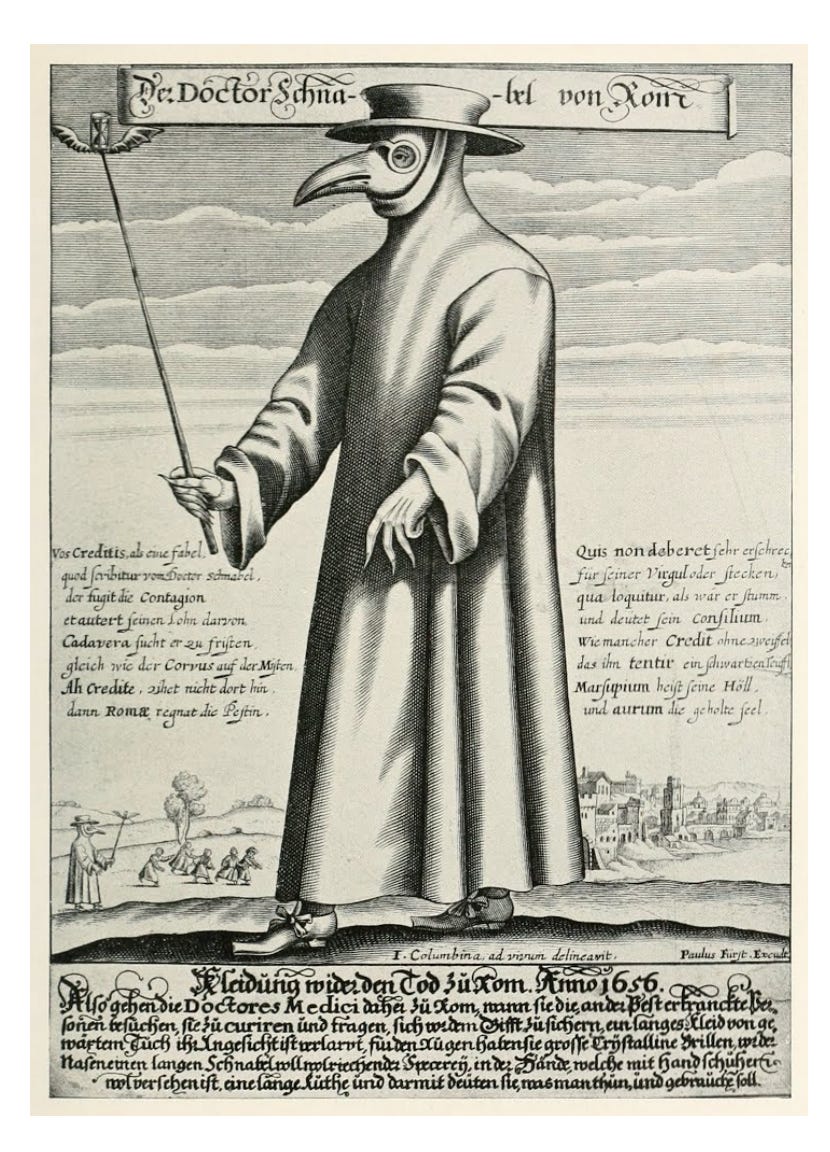Welcome aboard The Bus!
The Stop
Ockham’s Razor1 is an essential - and often very useful - tool in the philosopher’s kit. Also known as the ‘law of parsimony’,2 Ockham’s Razor is a technique of logic used to cut through rival arguments to uncover the truth of a given claim.
The general idea is that - given two competing arguments for any given issue - the simpler, less-complex argument is usually correct. The adverb isn’t accidental. Complexity certainly has its place and at times the more complex answer is the correct one. Scholars also point out that as a heuristic,3 Ockham’s Razor is a suggestion - more a guideline than a hard and fast rule - and if a more complex theory better explains the facts, then the more complex theory is preferred. However, empirical evidence is essential when making this decision - fantasies, wishes and beliefs running contrary to evidence must be eliminated as valid claims.
An example of how Ockham’s Razor works:
Common Cold … or Black Death?
You have a headache and a mild sore throat. Usually you’re very healthy and a sniffle is no big deal. But this morning for some reason you decide - against all good judgement - to Google your symptoms. Scrolling through the seemingly innumerable ailments and diseases for which these are symptoms, you suddenly discover you might be suffering from the early symptoms of the Black Death.4
Before panicking, ask yourself: what is the simpler explanation for your symptoms? Are you actually experiencing the onset of the common cold? Or are you somehow - despite any possibility of being exposed to the pathogen responsible - about to succumb to plague?
Remember: the answer requiring the fewest assumptions is usually the correct one.
Answer: It’s not the Black Death.
Which is good, because you don’t want this guy5 appearing in your neighbourhood:
When it comes to determining the truth, it never hurts to look at both sides and then wield Ockham’s Razor. It isn’t always correct, but it’s a good place to start.
The Detour
Today’s Detour is to a recent article on The Big Think, an online newsletter - published weekly in various permutations - dedicated to doing exactly what it says on the tin.
This article - What does Buddhism offer physics? - looks briefly at some contemporary thoughts about the common ground shared between quantum physics and Buddhist philosophy.
The Book
Today’s book is Christopher Moore’s Lamb: The Gospel According to Biff, Christ’s Childhood Pal.
In this novel, Moore - author of (among many others) Island of the Sequined Love Nun, The Lust Lizard of Melancholy Cove and Fool - concocts a unique version of Joshua (AKA Jesus)’s life, as told by his best friend, Biff. If you’ve ever wondered how JC was able to grow up resisting temptation and what really happened during those missing 18 years … this book offers an answer. Lamb is irreverent and thought-provoking, but most of all very, very funny.
From the cover:
Verily, the story Biff has to tell is a miraculous one, filled with remarkable journeys, magic, healings, kung fu, corpse reanimations, demons, and hot babes, Even the considerable wiles and devotion of the Saviour's pal may not be enough to divert Joshua from his tragic destiny. But there's no one who loves Josh more - except maybe 'Maggie,' Mary of Magdala - and Biff isn't about to let his extraordinary pal suffer and ascend without a fight.
Remember: You can buy Lamb at Amazon, but you can also get it from your local bookstore. And that’s better for everyone.
The Sounds
Here are some songs I’ve been recently listening to. Please feel free to shuffle or skip through, but I’d appreciate you listening to it in order at least once as there is method to the mix!
The Question
Today’s Question is from Professor Tim Maudlin6, from the book The Last Unknowns. Part of a series of books published by edge.org in which scientists, artists, writers and thinkers were asked to contribute their thoughts on various topics, The Last Unknowns is this organisation’s final publication - with the stated goal of asking these thinkers their ‘last question, the question for which [they] will be remembered.’7
The Question: Why are people so seldom persuaded by clear evidence and rational argument?
And that is the end of this stop - I hope you enjoyed the diversion from your regular journey.
Thanks to everyone who subscribes - I genuinely appreciate your interest and support. If you like The Bus, please SHARE it with a friend or several hundred.
If you haven’t climbed aboard, please do!
Until the next stop …
Though he didn’t actually invent the technique named after him - there are similar expressions stretching as far back as Aristotle - William of Ockham (c.1287-1347) was an English Franciscan friar born in the village of Ockham, Surrey: https://plato.stanford.edu/entries/ockham/#OckhRazo
Fun Fact: Ockham (the village) is probably better known for its proximity to RHS Wisley - the Royal Horticultural Society’s flagship garden about two miles down the road - to which a visit is an absolute must: https://www.rhs.org.uk/gardens/wisley
Parsimony is the extreme unwillingness to spend money or use resources. https://dictionary.cambridge.org/dictionary/english/parsimony In this case, Ockham wants us to be stingy and use as few ‘resources’ as possible when formulating an explanation. Parsimony - a great word reeking of old, musty books, hushed libraries and sin. Lots of sin.
Almost always used as an adjective (e.g., heuristic education), I recently learned heuristic is also a noun: a method of learning or solving problems that allows people to discover things themselves and from their own experiences. https://dictionary.cambridge.org/dictionary/english/heuristic
While Google will take you awhile (I searched for ‘headache and sore throat’ last night (10 April) and in 0.49 seconds I received 226,000,000 hits). I added ‘plague’ after ‘throat’ and the first page I was offered was a link to the US Government’s NIH’s National Library of Medicine linking me to the Black Death. And this isn’t unusual. The reality is that there are many, many more diagnoses for these two common symptoms provided before you reach the common cold. In a weird way, it’s as if the common cold no longer exists. Oh, and for some reason I’ve been unable to embed a link to that webpage. I’m sure it’s just a combination of my limited skills and some sort of coding matter, but imagine if one tended towards paranoia ….
Doctor Schnabel (i.e., Dr. Beak), a plague doctor in seventeenth-century Rome, circa 1656. Plague Doctor







People suffering nervous breakdowns often do a lot of research, to find explanations for what they are undergoing. The research, of course, fails. It fails as far as we are concerned, but the unhappy fact is that it sometimes provides a spurious rationalization to the disintegrating mind. The mentally disturbed do not employ the Principle of Scientific Parsimony: the most simple theory to explain a given set of facts. They shoot for the baroque.
P.K. Dick, Valis
Thanks for the book suggestion! My copy of "Lamb" arrived today.